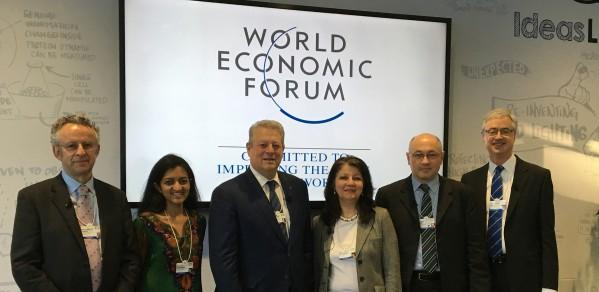
The Vice Chancellor of the University of Cambridge led a delegation of academics to the annual meeting of the World Economic Forum at Davos, Switzerland, in January 2016, to explore issues including carbon reduction technologies and how science and engineering can best address society's greatest challenges.
The event was supported by Energy@Cambridge, a Strategic Research Initiative of the University that brings together the activities of over 250 world-leading academics working in all aspects of energy-related research, covering energy supply, conversion and demand, across a wide range from departments.
The meeting’s theme was ‘Mastering the Fourth Industrial Revolution.’ Klaus Schwab, Founder and Executive Chair of the WEF, said: “We stand on the brink of a technological revolution that will fundamentally alter the way we live, work, and relate to one another. In its scale, scope, and complexity, the transformation will be unlike anything humankind has experienced before. We do not yet know just how it will unfold, but one thing is clear: The response to it must be integrated and comprehensive, involving all stakeholders of the global polity, from the public and private sectors to academia and civil society.”
This year’s programme was designed to engage participants with more than 250 official sessions divided across four programme zones. In the Discovery Zone participants’ experiential learning was brought to life by virtual reality, satellite imagery and robotics. The Collaboration Zone focused on building networks of action-oriented leaders across stakeholder groups to steward progress on the world’s most pressing challenges. The Debate Zone delved into current affairs and explored the issues at the heart of today’s economic and policy debates. Finally the Disruption Zone defined the paradigm shifts and conceptual breakthroughs with profound implications for industry, government and society and included the ‘IdeasLab’ and ‘What if’ debates.
The IdeasLab was a relatively new initiative at Davos: a 75 minute session in which four academics from one institution deliver themed, Pecha Kucha-style presentations followed by breakout group discussions. The University of Cambridge IdeasLab was on the theme of carbon reduction technologies and the presentations and discussions focused on how the latest advances in carbon reduction technologies will transform industries and improve the state of the world. The session ran twice: The first on Wednesday afternoon was introduced by Professor Sir Leszek Borysiewicz, Vice-Chancellor of the University of Cambridge, and moderated by Sir Philip Campbell, Editor in Chief of Nature; the session ran again on Friday morning and was introduced by former US Vice President Al Gore and moderated by Professor Jim Leape, Professor at the Woods Institute for the Environment at Stanford University and former WWF Director General.
The University of Cambridge delegation, all members of Energy@Cambridge, consisted of:
- Professor Markus Kraft (Department of Chemical Engineering and Biotechnology): Decarbonizing industrial-scale processes using virtual avatars
- Professor Abir Al-Tabbaa (Department of Engineering): Self-healing concrete for low carbon infrastructure
- Professor Richard Friend (Department of Physics): Improving solar materials efficiency using quantum mechanics
- Dr Suchitra Sebastian (Department of Physics): Quantum materials for zero-loss transportation of electricity
Energy@Cambridge is working to develop new technologies to reduce the carbon footprint of industrial processes, energy generation and transmission, and building construction. Its aims include leveraging the University’s expertise to tackle grand technical and intellectual challenges in energy, integrating science, technology and policy research.
The initiative has four Grand Challenges, focused on developing and delivering new large-scale collaborative activities, facilities, centres and research directions by bringing together academics and external partners to work on future energy challenges where we believe we can make a significant impact.
- See more at:
http://www.cam.ac.uk/news/university-of-cambridge-at-the-world-economic-forum-2016

